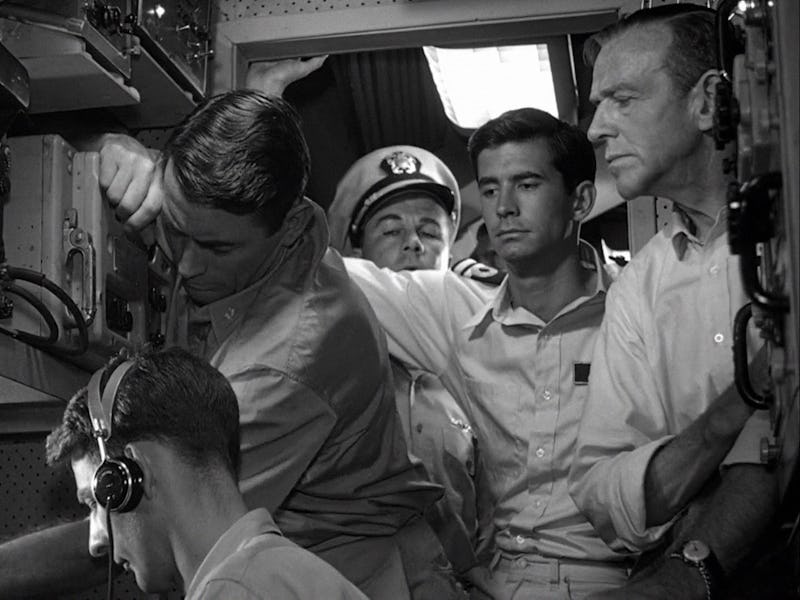The Most Quietly Unsettling Post-Apocalyptic Movie Ever Is Still Relevant
The world will end with a bang, then a whimper.

A massive cloud of radioactive fallout is headed toward Melbourne, Australia, all but ensuring the last known survivors of the human race are doomed. Set in the aftermath of a nuclear conflict that’s wiped out the rest of the planet, and based on the 1957 novel by British author Nevil Shute, On the Beach sees Gregory Peck, Ava Gardner, Anthony Perkins, and Fred Astaire simply try to go about their everyday lives for as long as they can.
Directed by Stanley Kramer and released 65 years ago today, On The Beach is notable in that it doesn’t contain scenes of missiles launching, cities disintegrating, or ravaged survivors clawing at each other to stay alive amid the ruins of civilization. Some of this may simply be down to budgetary limitations; when a surviving American submarine searches the West Coast for the source of a mysterious Morse code signal, we see an intact but eerily empty San Francisco, which Shute’s novel describes as destroyed. But the focus here is on Melbourne as the survivors try to deny their imminent demise.
Much of On The Beach plays like a conventional drama, almost a soap opera, albeit with a fatalistic shadow cast over it. The principal characters, submarine commander Dwight Towers (Peck) and alcoholic socialite Moira Davidson (Gardner), strike up a tentative romance despite Towers holding out hope that his wife and children, left behind in the United States, are somehow still alive. People have parties, go to work, head out on camping trips, visit parks and pubs, and even attend the Australian Grand Prix. A scientist named Julian Osborn (Astaire) purchases a Ferrari so he can participate himself, although, on a somber note, the drivers don’t care about the risk of fatal crashes.
In shades of A Quiet Place decades later, Perkins and his wife (Donna Anderson) even have a newborn, although Perkins’ naval lieutenant is much more realistic about the fact that, when the radiation drifts over Melbourne in a few months, they’ll have to feed themselves and their baby state-issued suicide pills to avoid the worst ravages of radiation poisoning. The scenes of strained domestic life between Perkins and Anderson are among the movie’s most affecting, as are several quietly intense moments aboard the sub.
In one instance, Peck, Astaire, and Perkins simply exchange wordless glances as they take readings near Alaska and realize the radiation hasn’t dispersed, as one scientist back in Melbourne had theorized. In another, they all smile painfully and share a morbid chuckle when it turns out that America’s phantom Morse signal has been caused by a Coke bottle stuck in the cord of a window shade, randomly tapping on the telegraph key as it bobs up and down in the breeze.
Unfortunately, the film’s dire warning still feels relevant today.
In keeping with the movie’s restrained nature — a 2000 made-for-TV remake was more direct in its imagery of destruction — geopolitics are left out of the story, and no nation is blamed for starting the conflict. At the same time, it’s genuinely unsettling to watch the film keep its attention on the four excellent leads and their increasingly desperate efforts to lead normal lives despite knowledge of what awaits. At a time when American leaders continue to deny the impact of climate change, and a superpower has flirted with using nuclear weapons in a brutal invasion that threatens Europe, On The Beach is a grim reminder that we can’t ignore the specter of annihilation that hangs over our civilization. “If everybody was so smart, why didn't they know what would happen?” cries Gardner at one point. “They did,” Peck replies.
The ending of On The Beach is still among the bleakest in movie history. Astaire, in the first major dramatic role of his career, commits suicide in his garage. Perkins and Anderson recall joyful memories of how they first met as Perkins prepares cups of tea with the pills in them. Gardner and Peck share one last embrace before he takes his sub back out for its final voyage, his crew having decided to try making it home to meet their end there.
Eventually, everyone is dead. The wind blows through the empty streets of Melbourne like a ghost anxious to find someone to haunt. Nothing moves. Most devastatingly, an evangelist’s banner proclaiming “There is still time .. brother” hangs forlornly over a deserted town square. There wasn’t, and the saddest realization of all is that no one did anything about it.